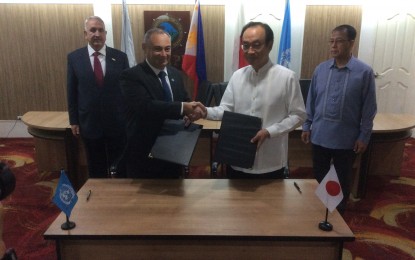
Jose Luis Fernandez, FAO Philippines director and Japanese Ambassador Koji Haneda shake hands after the signing of the exchange of notes on the Project for Agricultural Training for the Establishment of Peace in Mindanao. Standing as witnesses were ILO Philippines head Khalid Hassan and OPAPP chief Carlito Galvez Jr. (Photo by Joyce Ann L. Rocamora)
MANILA -- Japan and the Food and Agriculture Organization (FAO) of the United Nations will start implementing their USD1.76 million agricultural training program for the Bangsamoro region in March 2019, the FAO announced Wednesday.
FAO Philippines Director Jose Luis Fernandez during the signing of exchange of note with Japanese Ambassador Koji Haneda in Ortigas expressed optimism the initiative would be able to "significantly contribute" to promoting inclusive growth in the region.
"This new collaboration effort will be able to contribute to the development of agriculture and agri-business in the provinces of Basilan, Sulu, Tawi-Tawi and Zamboanga Sibugay," he said.
"We are optimistic this will strengthen people collaboration to promote food security and strengthen the agricultural sector in the whole Mindanao," he added.
Fernandez also underscored that the project is supportive of the government's Philippine Development Plan 2017-2022.
Aside from the agricultural sector, the program's area of intervention includes fisheries with target beneficiaries of around 2,000 farmers and fisherfolk and their households.
The project, which is expected to run from March 2019 to February 2020, seeks to improve the agriculture-based vocational skills of former combatants, indigenous people, and out-of-school youth as normalization process starts in the region.
In implementing the initiative, FAO will be coordinating with the Bangsamoro Transition Authority, the Office of the Presidential Adviser on the Peace Process (OPAPP), the Department of Agriculture as well as the Mindanao Development Authority.
Mindanao, the country's second largest island, is a major contributor to the Philippine economy with its production of high value commodities such as rubber, coffee, pineapple and banana.
According to 2016 data of the Philippine Statistics Authority, agriculture in Mindanao alone provided employment for 4.08 million persons or about 36 percent of the country's total employment in the sector.
However, persisting challenges in pursuing lasting peace in the region have rendered Mindanao's inability to maximize development.
On Wednesday, Haneda also signed the Community-Based Water Supply Development in the Bangsamoro Region Project with the International Labor Organization (ILO).
In a speech, OPAPP Secretary Carlito Galvez Jr. thanked the Japanese government as well as the FAO and the ILO for their commitment to the peace process and support to develop Mindanao.
"The ceremonial signing for these projects, funded by the Japanese government and implemented by the ILO and FAO, signifies our country’s and the international communities’ shared responsibility to help build a better Bangsamoro Region," he said.
"Indeed, these projects demonstrates that you are with us for the long haul," he added. (PNA)
